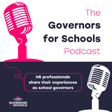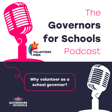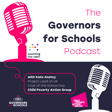Become a Creator today!Start creating today - Share your story with the world!
Start for free
00:00:00
00:00:01

Using your finance skills in a school governance role
In this episode, we speak to Alex Marsh - previously UK CEO of Klarna, co-founder of Charterpath, and proud school governor at a school in Brighton. He tells us about his school governance journey, the opportunities it affords for professional development, and the rewards of giving back to his local community.
If you want to find out more about becoming a school governor, visit our website: https://bit.ly/GfSAboutTheRole
Music by: Bensound.com/free-music-for-videos
License code: GGXDEC3OBQEGW4XO
...
Transcript
Introduction to Governance and Finance Professionals
00:00:00
Speaker
Hello, everyone, and welcome to this episode of the Governors for Schools podcast, the best way to learn about a wide range of issues affecting today's governance landscape.
Meet the Hosts: Anthony Melia and Claire Skinsley
00:00:11
Speaker
My name is Anthony Melia, Partnerships Manager with the team here at Governors for Schools, and I am delighted to be one of your hosts today. I am joined by my colleague, Claire, who I will let introduce herself. Hello, everyone. My name is Claire Skinsley, and I'm the Partnerships Manager for our corporate partners here at Governors for Schools.
Inclusivity in School Boards and Ongoing Campaigns
00:00:31
Speaker
This podcast is geared towards an introduction to school governance for finance professionals as we know both the need for such professionals across school boards and the value that they bring to the governing table.
00:00:44
Speaker
At the time of this recording, we are running our inclusive governance campaign. We always encourage volunteers to bring inclusivity to the forefront of their role, ensuring boards are representative of the communities they serve. This is something which we will look to link into our conversation today concerning our guests' experience.
Introduction to Alex Marsh: Finance Professional and School Governor
00:01:03
Speaker
Speaking of which, today we are joined by Alex Marsh, who is a finance professional and a school governor. I will now hand over to Alex to introduce himself. Hi, my name's Alex, Alex Marsh. I am ah very proud to be a school governor. so That's from ah a volunteer side. um I spent the past 20 years working in the UK banking and payment sector. I included five years at Klarna, where I was the UK CEO. Alongside my professional life, always been very active in terms of volunteering. Yeah, I've been a school governor for the past eight years. um I also founded a charity called Charter Path, which I now run with a friend.
00:01:38
Speaker
which is all about ah linking up ah charities and schools with volunteers with financial skills. Brilliant, thank you so much for joining us today Alex. We'll be talking with Alex throughout this episode to better understand how finance skills are so vital to the role of a thriving school governing board and to gain some insight into his school governor journey. As hosts, Claire and myself will be contributing today by letting you know more about who we are as governors for schools, why Alex's mission resonates so strongly with us and how you yourself can get involved and utiliz utilize your invaluable skill sets. So to kick us off, for it would be good if we could talk a little bit about Alex's governor journey.
Alex's Journey from Finance to School Governance
00:02:20
Speaker
So if you wouldn't mind Alex, can you talk us through your governor journey in terms of where it started and what made you interested in becoming a governor in the first instance?
00:02:30
Speaker
Yeah, sure. So it's probably that when I think about that question, I think the honest answer is it goes all the way back to my own childhood. So I grew up in in Brighton, where I live now, um middle child of three brothers with a mum who is a maths teacher. So I was one of those kids where I think because I was a like typical middle child, always sort of craving for attention, you know, neither the first child who sort of special first child or the baby of the family and I quickly found that actually being successful at school was one of the ways I could almost sort of stand out and um and so absolutely I would be sort of the definition of at school like what those sort of nerves you had at school you know I had like even built like a sort of mini science lab in our garage as a child and just absolutely loved it kind of really threw myself into it and and for me it's it fed lots of sort of opportunities in my life so as a first person for our family to
00:03:18
Speaker
really, you know, growing up at state school, but very lucky to then go on and go to University of Cambridge, where I got to study chemistry, ah surprisingly. And, um and but it was really that sort of sort of seed of loving to learn and then went on to then study to be a chartered accountant. And that's kind of where my finance career started. And then, and then actually was in my professional life, like I really threw myself into my professional life. And to be honest, probably at the detriment of other things, whether it was kind of hobbies and friends and other things like that, I just got my head down and really threw myself in my career. It was actually when I was working, I was working in a UK bank ah in the centre of London, right in the city, and they had the opportunity to volunteer to read with children in Tower Hamlets, and it was incredible. that We went out to tap this school, about nine, ten years old, and it was just an absolute eye-opener to sort of, you know, one and a half miles from the office where we were working, but then to see sort of the deprivation, frankly, on your doorstep and helping kids to give them a bit more time to support them with reading, many of them English was the second language,
00:04:16
Speaker
but seeing them they were reading and helping them read books where they're the same books at home we had a daughter Isabelle that she was reading at probably like four or five years old and you just kind of realize what impact this is going to have in terms of their ability to read what that would mean for their future school life their future careers and it was actually that where we then moved down to Brighton the trigger for me to then think like right what more can I do to support I've had so many benefits from my own state school education what more can I do to support and I have the idea to then become a school governor and go in touch and became a school governor, linked to being a finance link governor. So going back to that sort of finance background that I had, it was an opportunity to bring some of those finance skills very quickly.
00:04:56
Speaker
um to a secondary school and then from there you know opened up so many opportunities in terms of you know we could talk about it more but opportunities then as chair of governors and i've been there now for yeah eight years and currently supporting on both our student personal developments mental health but also career side which obviously is really brilliant thank you it's always such a treat to hear from governors about what their inspiration was for moving into volunteering on a board and I'm sure a lot of people listening to this even if some of them of our place governors will be able to relate to that experience of bringing forward your own memories from from being younger.
00:05:32
Speaker
other voluntary opportunities, which have informed how you might want to, to dedicate some of your spare time and also how you can bring in a lot of your professional yeah and development as well. So that's and actually a really universal experience among a lot of the volunteers that we work with on a day-to-day basis. So thank you for ah sharing that. So I'll pass over to Claire now, who has a question around the changing nature of your role. oie Yeah, thanks for that, Anthony. And Alex, it was great to hear about how you kind of got into the governor role.
Challenges in Governance: Financial and Pandemic-related
00:06:05
Speaker
And I know that you mentioned you've been a school governor for eight years now, and you also mentioned that you're now a chair of governors. So I just wanted to kind of touch on that really, and to see whether your view on the school governor role has changed throughout your time in the role, if at all. Yeah, so it's it's it's really interesting. I mean, one part, just being really honest about it, when I first got in touch, like I wanted support and I wanted to get involved.
00:06:30
Speaker
And I wanted to be involved in our local community, but I genuinely had no idea of the scale of like school governors in the UK. So I was like doing a bit of a Google and it's the largest single group of volunteers in the UK over 300,000 school governors. And that kind of just the sheer scale of it is, is unbelievable. And I think, and the importance of that role and the and the variety of kind of skills that you can bring to those roles. For me, like the finance link side was a real obvious entry point coming in because it was my background. and And I think even eight years ago, some of the challenges that schools faced financially were starting to become more apparent in terms of funding. And that's why, you know, at the time, the school that I contacted were really keen to get someone who had, you know, I trained as a charter accountant who had that kind of background support and bring, I suppose, sort of more advice and challenge to the school's finance. One of my experiences over that eight years has been that
00:07:24
Speaker
I think those financial challenges have just intensified in that in the eight year period and I don't think our schools alone in that and and that this isn't coming from a political perspective at all it's just sort of thinking about the reality and I think there's different drivers behind some of those increased sort of challenges financially obviously we saw for example obviously like inflationary costs in the last few years have like had a huge impact on schools rising energy costs etc has been a big driver in that but also the complexity of the need of students has really changed over that time and in terms of you know for example in our school I think over a quarter of our students have some form of special educational needs that needs you know additional support so I think that I could definitely see that
00:08:03
Speaker
the sort of demand on governors to provide that element of the kind of pillars of their responsibility around finances is really intensified. And I think when I first joined, it was probably more to, you know, advise and challenge the head teacher in the school team and sort of strategic direction. But I think the finances has become such a sort of meaty topic. I think some like particular bits of kind of moments have stood out for me when I think about that journey, obviously, the um the impact of the pandemic. And I think when I looked some of the um yeah back to that point around some of the challenges that we've had, you know, I see it now as sort of the link for mental health, some of the challenges on students, you know, post pandemic. But if I go back just to the absolute nuts and bolts of when, you know, as chair of governors, we were, you know, suddenly finding ourselves in a situation where externally new things were
00:08:49
Speaker
happening and it was you know getting i suppose a bit sort of more worried in terms of what this like new virus could mean. But then suddenly we were like invoking this sort of disaster recovery business continuity plan that had been a one in 25 year scenario. solthough We talked more thoughts about the school building closing, for example, in the context of if the school burnt down or something. And then suddenly we found ourselves in this situation where Essentially, we were closing the building down, apart from yeah a very small group of students, those where parents were in key roles, et cetera. And and the the sort of implications and consequences of that, and sort of the demands on governors, again, particularly, like I was finding for myself, trying to make sure I was providing the right support to the school team, because they're obviously, same situation, completely different.
00:09:31
Speaker
crazy scenarios like playing out reality and how we keep the students supported. But to bring it back to the finance side, just briefly on that particular scenario, because was it was over like such a difficult and challenging time. But with we found very quickly we were going out to families and students to try and support them for home teaching. and just the reality of suddenly finding you know back to roughly yeah I think 30% of our students on pre pupil premium like we have a very kind of mixed catchment for our secondary school in Brighton and you know we're suddenly finding you know many of them they didn't have laptops at home they didn't have a computer that you know the student could access for home learning but not only that so we then were getting all the laptops out schools like literature drive and the RAM
00:10:13
Speaker
but didn't have didn't have access to Wi-Fi. And you know, there's things that often we live in this sort of neat bubble of life where all these things are seen now, you can switch to, you know, to home learning. And again, I go back to the finances, we're in a situation where we had like, it was a lot of meetings, but we were able to make decisions very very, very quickly, because we managed our finances very, very, you know, tightly in London, very tightly, to invest in additional laptops, to invest in Wi-Fi dongles, and got them out to kids like that weekend, that first weekend. So in theory, on the Monday, we had all the students could be going into remote learning and that fundamentally came down to an amazing school team got an incredible head teacher in the school but also the role that governance played to kind of step in and support make decisions quickly and we found that relative to say other some other secondary is not just in our you know brighter the home but it took up to six weeks to get their students to that same
00:11:05
Speaker
situation of having all university having access to you know laptops and wi-fi so it ah it's kind of one of these moments where you really felt like both the skills that you brought but also really brought to life the roles of governors where this isn't just like you know it doesn't have to just be a family meeting and actually you could really change the impact of you know the lives of kids in your community so that really kind of stands out to me as one of those kind of pivotal moments where all the different strands what it means to be a governor working with the school managing the finances really came to life to make a big difference yeah definitely yeah that's a really interesting point alex and i suppose one of the three core functions one of them being overseeing the financial management of the school i suppose that took on a whole new light during the pandemic completely because
00:11:50
Speaker
In time, like the government moved to provide additional funding to provide access to, you know, whether it was laptops, Wi-Fi, you know, the resources, but it understandably took time because you're trying to roll that out across thousands of schools. um But we were able to make decisions because we had been monitoring the finances very closely in terms of like both the sort of day-to-day running cost, but also like the capital expenditure that we had within the school. We were able to make decisions very, very quickly about like repurposing funds and actually to take a step back, I think, bigger picture, what's more important, like a a project that's planned for like nine months time to do X, Y, Z versus like getting kids to be able to be taught on Monday. And so we took those decisions collectively. And I think, yeah, it was, I think for me at the time, I was very, very busy in my professional life as well. Like I was leading Kleiner at the time and, you know, ah growing very, very quickly, bizarrely, but during the pandemic, something was stuck at home, you know, online shopping. But this gave me a real sense of purpose in terms of, you know, thinking,
00:12:46
Speaker
I'm not just at home working, sat at a laptop, I'm actually doing something where there are always amazing people, whether it was like scientists created vaccine, whether it's nurses, you know, supporting people in like, you know, ICU, you know, wards, etc. lots of people I think many of us felt helpless apart from being a saucepan but um this was something where you could really look back and think actually you could make a difference in your community and you know really help and I think we've seen the benefits of that if I'm honest like you know a couple of years on sort of legacy of that in terms of there the quality of teaching but also just the infrastructure to teach during that period well that's meant for
00:13:19
Speaker
students now who are for example sitting at GCSEs or finishing them like these very weeks right now when we're recording this you know the difference that actually they've got some quality teaching during that period of time that gave them the foundation blocks. Yeah Alex just linking on to that I just wanted to ask you what your process looked like in becoming a chair of governors and how you might describe your experience in that role as ah compared to when you were a school governor? Yeah so when I first came in I think the finance link role to be fair was a really good route into I think for example then going on to be chair of governance because I think from looking at the finances across you got to see almost like the whole end to end sort of running an operation in the school particularly from a financial lens and so that I think that then
00:14:05
Speaker
I think quite quickly, I felt like I kind of understood how the school was running. Now, again, sort of the reality of the chair of governance role, it is a different demand than, then a you know, for example, being the financial linkk governor link or the link governor for curriculum or other areas or careers like I know, because you are, you know, ultimately you're helping with the head teacher to drive, you know, fully drive that strategic direction. We had a situation where I'd been a governor for just over a year and it's not long. And we had like, We had to change our chair very very quickly at a very short notice and it was one of those things where with all the best planning, succession planning, etc.
00:14:42
Speaker
It was one of those conversations where the chair of governors was standing down and there was an element of right. you Unfortunately, our deputy chair wasn't in in a situation personally to take on the role. I suddenly found many gazing eyes on myself very intensely. I think some of it, because I was doing some of those types of roles in a professional capacity. they And so actually, you know i didn't I was very clear in time. I can't make a decision in a government board meeting like that. It's one that warrants proper decision discussion. But yeah, off the back of and some of those early conversations met with the the current, you know, who was then the current chair, the head teacher. And for me, the role was really appealing. So we were at sort of an inflection point in the school. There was quite a lot of change going on. We were looking at sort of the expansion of the school as an example. And so and the funding was becoming more of a challenge. And so, yeah, sort of the opportunity
00:15:35
Speaker
a lot of these things where those sort of roles come up at maybe every two or four years. So I thought, actually, there's a chance here. I remember speaking to a few friends and they're like, do you think I should do it? It's going to be a big time tomorrow. They're like, I don't get these chances very often. So I grabbed it. and absolutely loved it. I thought it would be probably our term in our school is for two years. um But at the end of those two years, it had gone very quickly, to be fair. um You know, agreed to then take on the chair for another two years, but generally could not have imagined that we that would then go into the situation, for example, like the pandemic, like where it was just, you know, it was such a
00:16:09
Speaker
extreme scenario. But I looked back on that four years and that four years went through physical expansion in the schools, new buildings went through student expansions, we increased the school size by 150 students. And we went, you know, through a situation where we went to sort of remote learning. And during that time, we went um on to become having let them in terms of student outcomes, like the highest progress eight and um attainment eight for Brighton and Hove in terms of state schools. So But again, incredibly proud of what we're able to achieve as a as a team and point to a new head teacher in that period. So got to do share pretty much all the different things you could kind of imagine and um in ah in a four year period. But yeah, incredibly proud. And then and and I thought to myself again, sort of in all honesty, I thought maybe when I finished the chair role, that maybe that would be the right time to set down and do something different. But I'd say being a school governor, it's quite addictive.
00:17:05
Speaker
because you kind of build your knowledge and understanding of the school and you get to know more people, whether it's the governors, whether it's the school team. And I suddenly found myself, I just couldn't step away. So hence I agreed to um move on to other areas in terms of yeah student personal development, which I think the mental health off the back of the pandemic and seeing that as chair was something like where I really thought I could support. And then also just careers development, because again, during the um During the pandemic, we weren't able to do, for example, work placements. So again, trying to work out clever ways to support students in terms of career development and reopening up to work placements. And so I've been doing those areas for, yeah, 18 months now. I absolutely love it. Thanks, Alex. It's great to hear how much progression that you've had in in the role, like especially from a personal perspective. And that leads me on nicely now to pass over to Anthony, who I believe is going to ask a question regarding budgets.
Hands-on Financial Monitoring in Schools
00:18:00
Speaker
I am as Claire said it was so fantastic to hear about the different ways in which the school has expanded and continue to progress, particularly during a really tough time, that was the pandemic and the impact of remote learning. One of the things that when I was listening to you that I picked up on was a lot of talk around finance and monitoring budgets. Now this is obviously something which differs from school to school, from academy to academy, but I really wanted to ask what does monitoring budgets actually look like on your school board or what would it be like for our volunteers who want to take it? Yeah, so the point that you said Claire about sort of development and learning opportunities, I was very fortunate, I had like lots of like
00:18:42
Speaker
support and learning and training and when I took on the finance link role. And and actually, I think from my professional life as well, there's lots of sort of experiences and tools and approaches that you develop for just managing the, you know, I've had roles in my professional life as a finance director or CFO for a period of time at Klarna in the UK. And so I felt like I could kind of bring those elements together. Plus, we had on our governing body, we did have um a couple other individuals who came from kind of finance roles or finance backgrounds. um And so for us, the monitoring ultimately has become quite hands-on. And I think, you know, back to the sort of, I suppose, the challenges financially. When I first joined as the governor there, the school actually had a surplus. I mean, that's almost unheard of in schools, state schools in the UK now. but
00:19:26
Speaker
We had sort of a relatively healthy surplus that a school had sort of built up. And, you know, we were looking at ways to invest that, et cetera. And obviously, that that has now gone. And we're in a situation where actually the close monitoring is really important. Steps that we took on a practical level, and I'd really recommend was we did mobilize, you know, finance work and great finance committee as an offshoot from the main governing body. And that was fundamentally to give more time, you know, offline from the governing body. Gender to really kind of scrutinize challenge question and build on standing the school's finances So we have always every governing body meeting, you know finances as an update item on there But yeah between every governing body meeting we have a finance committee and we are it's typically led by the head teacher and the school's business manager in our case, but they'll be sharing
00:20:12
Speaker
both of the kind of latest actual financials in terms of what have we spent, you know, for the previous term versus what was in the budget, any kind of unexpected items, either overspends, unspends. We'll also have within those sessions, a reforecast essentially for the full year. So whilst we've got the budget for the full school year, what's the kind of latest full year outlook in terms of the school finances? And not just a top level. So it's not kind of just like, oh, look, we expected to have, you know, a small surplus of £30,000 and it's actually £10,000 We're doing that down at a line item level. and We're looking at things, for example, when we look at the, you know, one of the largest items obviously for us is is um like the school team costs, so both teaching and non-teaching staff. And looking at that in the context of, for example, the actual structures of the staff, the different pay bands that we have within the staff.
00:21:03
Speaker
that links through to sort of pay recommendations as well. And then other areas we look at in terms of monitoring, we'll look at on the non-staff, we'll be monitoring at a line item level, for whether it's things like, I don't know. cost net of the canteen that we operate or cleaning costs or energy costs like we talked about. We'll also look at for example contracts that we have within the school ah for third-party suppliers that could be energy contracts for example Paridicon to really look at those to see are there opportunities to you know ultimately optimise the costs that we have to get the best service.
00:21:34
Speaker
So, yeah, it's really from a finance committee perspective, you know, like a really good sensible level of scrutiny. I think the school team really value the support that we're bringing. The kind of challenge is very constructive, you know, and gives them sort of hopefully a route to get advice and support. But one important point I would add to that is that we've got members on that finance committee who are both people like myself who come from a finance background, but also people from a non-finance background. So I think one part which is so important is is's to is to have those different perspectives. Ultimately, schools aren't just a yeah profit and loss business. at least you know Ultimately, it's about the trade off in terms of the different ways you can use the funds to ultimately drive the best possible outcomes for your students. And so having you know broader perspectives where you're getting the right challenge alongside obviously with the school team, I think has been really helpful. And I think also of then when you then go back into
00:22:28
Speaker
you know the governing body, you've got people from all broad perspectives with a level of understanding. I think you can have you know that situation understandably where the finance can end up being you know ah sort of led by a very small group of governors. Actually, where we've got to is it's a broad grid. I think that's where you get the best outcomes in terms of decisions on where you use the money to get the best possible student outcome. I agree. I think it's fantastic that you just raised that point, Alex, around how a lot of this might be new for governors coming in, but that really great governing boards are a collaborative effort. They're a team effort. yeah and There's usually what around seven to 12 people who sit on a governing board. And I think what unites them all, despite the variety of of professional background professional experiences, will be that they have a passion.
00:23:17
Speaker
and a willingness to learn about how to improve a school for the benefit of all of of their young people and so that's really great to hear particularly about the collaborative nature. And I think you can get that situation with finance where people can I think typically finance professionals but typically inadvertently can make it a bit like exclusive or separate and whether it's the language they use or the reports that they use. I think one of the things that you know we've got really good business manager in our school in she's fantastic um and she very much could bring the school's finances to life in a way that everyone can understand where you can sort of go right we want to run that program to help that specific group of
00:23:59
Speaker
of students like we can ring Spencer funds to understand what you know funds for example that we're investing in that project and map that through to the outcomes of that project so I think that but I think getting to the point where all the governors can relate to the finances and it's not just sort of an abstract thing to one side I think is really important because that way you can you know sort of back to how do you get the biggest retail investment for your students ultimately and how do you get the best value for money in terms of running the school so Yeah, I think yeah collaboration could not agree more ultimately on ultimately other collaboration points. Which I guess, to me, links to a question that I love to ask our volunteers who have been placed on governing boards for for a little while, which would be, what would you say to yourself or or what little piece of advice would you give to your pre-governor self before starting
Advice for New Governors on Collaboration and Resources
00:24:48
Speaker
out? Well, talk of collaboration. like I've had very hard like one piece from that, so I'll distill it to three. but
00:24:54
Speaker
The first one, like completely linked to collaboration is to ask lots of questions. Like don't be afraid to ask questions. And that can be as simple as I remember in those first government body meetings, like my phone under the table, just like desperately looking at acronyms. Cause I was too like embarrassed to go, what does, you know, E H C P V and what does, you know, even, you know, progress eight attainment eight, I thought just desperately looking up all these phrases. And so I think asking lots of questions is really important. And there's, you know, it's back to the source of birth. saying if there aren't any stupid questions obviously obviously you can use Google, and there are tools out there so a lot of it offline from meetings you can look up yourself and um but ask questions would be you know one thing and you know even more than you could maybe think of and I think that links into my second point which is
00:25:40
Speaker
particularly when you're embarking on that governor journey, but not exclusively then, is to really tap into the resources that are available. There's so many brilliant resources out there to help you perform your duties as the governor, to help, you know, best support your school and whether that's resources from governance for schools, whether it's resources from the National Governance Association, whether it's resources within within your school itself in terms of spending time and I, for example, joined um I spent time with the the sort of previous finance link governor to really spend time with you know that individual to understand the role and how they envisage it. I spent time with the school business manager um you know went through a lot of the kind of resources and policy documents and then I also got loads I got loads of free training from the local authority so in our area they run some really good training courses in in terms of understanding school finances I'm telling the budgeting process that they operated. um So I think that'd be the second one is to really tap into the resources available and then the third one
00:26:36
Speaker
So I think it's really important, you know, about to that point that ultimately this is a school, not a business, is to spend time in the school and get in there and really understand it and see it. Because again, you can have the situation where our governing body meetings at our school, so Barn Dean School, in Brighton, typically in the evening, I obviously support, you know, the school team in terms of teaching students and running a school during the day. So typically you need to say six to eight in the evening. you can find yourself that you're spending most of the time in the school outside of school hours and it's quite weird in a way because you're not actually seeing the students who are you know ultimately you know your role there is supporting them so I really recommend getting time in the school go and like learning walks spend time with other
00:27:21
Speaker
you know, you know, school team members beyond, you know, the head and their sort of leadership team. because You can get really interesting perspectives from students, from teaching staff, from non-teaching staff about what works really well in the school. what one thing I always ask questions like, what one thing would you change or improve in the school? um So I would, you know, that would be my three piece of advice. And I think when I first joined on that last piece, I spent a lot of time with the school business manager and I probably should have spent a bit more time in hindsight with um out in the school and particularly then when I took on the chair role that was brilliant actually. I just got to spend a lot of time actually in the school during the day and got to really see what was going on, like the reality of it. So when you talk about things like behaviour policies and again they can see that they're abstract
00:28:05
Speaker
You're actually in the school, you can see like, it's amazing. Look at your students, like how they're behaving and like the respect they're showing or whether it's the uniform policy and how does that really work in reality, like the practical side of being in school at that age. Yeah, they would be pro my three. piece of advice to someone who's embarking on their government journey. That was perfect. Thank you so much for sharing those pieces of advice because I know the a lot of our volunteers are brand new to government and they're brand new to education. A lot of our volunteers might not have children
00:28:36
Speaker
of their own yeah or may have left education a while ago. So to hear that there's lots of support out there, not just from governors for schools, but from local authorities and from people who are already working in our schools day in and day out is really fantastic. Claire, I'm aware I've chatted for a little while. Is there anything and that you would like to say that you think you're wrong with? Yeah, sure. Thanks for that. And Alex, I'm really glad that you touched on that point actually about kind of a school governor. They don't just to attend the board meetings, kind of like when working with local authorities and schools within our organisation. One thing that that the school boards always say to me, they're like, you want to you want a governor that's committed, someone that's going to send attend the a celebration events. So the the Christmas plays and the school fairs and and things like that. There's so much more to it than just kind of attending your
00:29:26
Speaker
your set out meetings for the year so yeah really glad that you touched on that point. Best day of the year Claire is the results day like absolutely like I always try and get in for that and I think again that was one of the interesting things as being chair in a way I became more aware of some of those items but then once I've done that I've like again it's like it's hard to give those things up but ultimately that's such a like a big day I try and get out to things like the sports days and some of the really important sports matches the schools have because that's been really important for us. And then we have like amazing like as part of the Brighton Festival, we had the artists open houses and the school opened up and showcase loads of the students like artwork. It's just phenomenal. And one thing I absolutely love actually is that when you bump into someone and you're like, you know, in Brighton where I live and
00:30:14
Speaker
I don't often tell them that I'm a governor of R&D and I often like yeah engineer towards finding out and one I was chatting to actually outside the school gates of my kids like the primary school and one of the parents was saying, oh they've been out to see this artwork at R&D for the Overhouses, which is like exceptional. And she was an artist and she was saying, I do like teaching it at b Brighton University and the quality of some of the students' artwork, which is higher than I'm seeing in some of the students at the university. And then and it's like, that so you be go oh yeah, but covered off at vaing that's really interesting. But actually to be able to like go and relay that into the the school team, that's the stuff that they want to hear and often they don't hear if you see what I mean, because they're doing it day to day. And so you know i just yeah all of that, everything that wraps around it is what makes and the the experience for students so special, but also will set them on the path to give them
00:31:04
Speaker
like the same choices that hopefully I you know give them the same choices that I had in my life. Yeah absolutely. I think as well that's why sometimes with with our volunteers that come through Governors for Schools they might think that it's a four-year term right a school governor role but really it takes you time to get to know the school and the workings of the school, the the children that attend the school, the school community um So yeah, it just kind of links back to what
Importance of Diverse Skills and Financial Acumen in Governance
00:31:29
Speaker
you were saying there. I just wanted to touch on Alex, you were saying rightly so, that a school governing board is made up of volunteers who have a variety of skills and different professional backgrounds. So I just wanted to delve a bit deeper into that then and ask how do you support others on the board who bring additional skills aside from finance? Yeah.
00:31:51
Speaker
finance being one of those key core responsibilities how do you kind of help? Yeah so I mean one of the things again that I've just absolutely loved about being a school governor has been like the variety of people that I've met and coming from all different backgrounds and all different skills and I think that's just one of the great things about being a school governor is is that variety and I think there's two parts from a finance specific side that I'm quite firm with in a way it's like on the one hand you'll often get people I, you know, I spend a lot of time so through the charity I started Child's Path that we help, you know, connect charities with and volunteers financial skills. so You often hear from them sort of trustees where they're looking for someone to say finance skills and they say like, I'm just not, I'm not a finance person. I don't get the numbers. I'm not, you know, and I'm often like quite tough on that message about ultimately
00:32:40
Speaker
we manage our personal finances like that's the responsibility that we take ourselves and I appreciate you know some people that's more challenging but ultimately we take that on to manage you know month in month out that we could make our finances work year in year out and what we're asking for governors coming to school is is to have that sort of similar mindset and that does require some investment to understand it and you know and there's some time and so that's why for example like encouraging some of our companies don't come from a finance background to come into the finance committee so actually making them feel really welcome to come in making them feel able to ask any kind of question that they want spending time with them offline from the meetings to talk through the finances because
00:33:18
Speaker
gets that point where you can provide like decent challenge and feel accountable frankly for it, you need to have a level of understanding. So I think it it is a sort of a two-way street I think and so you know another part of that is you know we've run some dedicated training for example for all governors on the finances, we've run some like really detailed sort of briefings, we run a difficult session, for example, when it comes up to time timing to sign off the budget and give more time to it in the governing body meeting because again it's just so fundamental to that school that the budget works and the finances work and you see some of the challenges and the implications for schools where
00:33:56
Speaker
but haven't been able to apply that kind of rigor and I appreciate every school is different in terms of the challenges of their finances but ultimately you know the sort of do they fundamentally work in terms of income per student and operating like the running costs but every school can apply that same rigor sort of the challenge and escalating like we've escalated and raised points for example due to the local authority where we just haven't been able to get the finances fundamentally to work or the school structures to work within the finances that we have. So I think yeah in terms of specifically I think we've had I think the training, the use of the finance committee and being an accessible group, dedicated time offline, really straightforward language that we use, really good quality reports that go into the governing body meeting with some commentary that goes with it. It's one thing to share a 16 page PDF spreadsheet, which anyone's going to find quite hard to understand, versus sharing that with two page commentary that goes with it. It highlights some of the key areas. We've highlighted the rows where there's either spend, unspent.
00:34:56
Speaker
i think they're always where then collectively people can start to understand that you don't have a much better conversation and dialogue. And then the other part which I think is really important for all schools you know linked to the finances and links to the monitoring question I raised earlier is around having clear sort of recommendations and asks and that's again sort of collaboration between the school team and the governors when it comes to finances. So rather than kind of sometimes you can present this information and you kind of get to the end of it from a finance perspective and it's sort of like, what's the so what? So what? Does that mean we're okay? Does it mean it's a disaster? Does it mean we need to change something? I think taking that extra step from a finance perspective to go, look, because XYZ, we're going to actually have to, you know, we went went through a really big restructure a few years ago and that was really hard, you know, laid people off and made some really, really difficult decisions. But that was off the back of like some really
00:35:47
Speaker
like good analysis over a long period of time then basically a recommendation so look the only way that we actually can make this work and actually now have to look at the structure the leadership structures all the way through the school and so I think yeah I think then when you get to that point then to that point earlier you get like a collaborative culture where then that naturally drives a high level of accountability across all governance. Yeah definitely and I think that highlights the point that there'll be skills that you bring to the to the governing board and there'll also be skills that you gain while being on part of a governing board and again I guess that's a but a benefit for anyone that would would like to is thinking about pursuing the school governor role it's the fact that they're
00:36:24
Speaker
there is benefits for you as a volunteer, rather than just kind of for for what you're also providing to the school and the school community as well. So definitely, that's great. Thank you, Alex. I believe Ant has one more question for you. I do, I do. I've only been speaking with you for just under 40 minutes, but I can tell that you're obviously motivated by giving something back to your local community and causes that have a positive impact on on us as a whole, so












